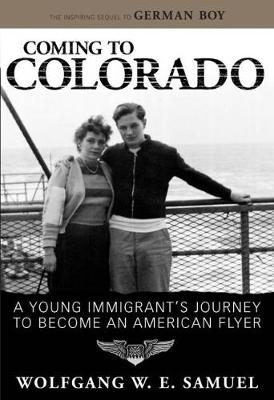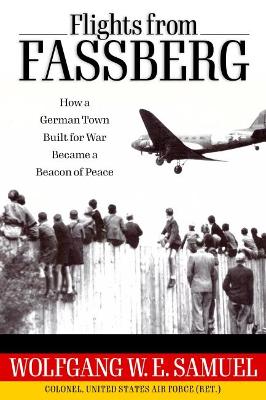Willie Morris Books in Memoir and Biography
3 total works
What was the experience of war for a child in bombed and ravaged Germany? In this memoir, the voice of innocence is heard.
""This is great stuff,"" exclaims Stephen E. Ambrose.
""I love this book.""In this gripping account, a boy and his mother are wrenched from their tranquil lives to forge a path through the storm of war and the rubble of its aftermath. In the past there has been a spectrum of books and films that share other German World War II experiences. However, told from the perspective of a ten-year-old, this book is rare. The boy and his mother must prevail over hunger and despair, or die.
In the Third Reich, young Wolfgang Samuel and his family are content but alone. The father, a Luftwaffe officer, is away fighting the Allies in the West. In 1945 as Berlin and nearby communities crumble, young Wolfgang, his mother Hedy, and little sister Ingrid flee the advancing Russian army. They have no inkling of the chaos ahead. In Strasburg, a small town north of Berlin where they find refuge, Wolfgang begins to comprehend the evils the Nazi regime brought to Germany. As the Reich collapses, mother, son, and daughter flee again just ahead of the Russian charge.
In the chaos of defeat they struggle to find food and shelter. Death stalks the primitive camps that are their temporary havens, and the child becomes the family provider. Under the crushing responsibility, Wolfgang becomes his mother's and sister's mainstay. When they return to Strasburg, the Communists in control are as brutal as the Nazis. In the violent atmosphere of arbitrary arrest, rape, hunger, and fear, the boy and his mother persist. Pursued by Communist police through a fierce blizzard, they escape to the West, but even in the English zone, the constant search for food, warmth, and shelter dominates their lives, and the mother's sacrifices become the boy's nightmares.
Although this is a time of deepest despair, Wolfgang hangs on to the thinnest thread of hope. In June 1948 with the arrival of the Americans flying the Berlin Airlift, Wolfgang begins a new journey.
""This is great stuff,"" exclaims Stephen E. Ambrose.
""I love this book.""In this gripping account, a boy and his mother are wrenched from their tranquil lives to forge a path through the storm of war and the rubble of its aftermath. In the past there has been a spectrum of books and films that share other German World War II experiences. However, told from the perspective of a ten-year-old, this book is rare. The boy and his mother must prevail over hunger and despair, or die.
In the Third Reich, young Wolfgang Samuel and his family are content but alone. The father, a Luftwaffe officer, is away fighting the Allies in the West. In 1945 as Berlin and nearby communities crumble, young Wolfgang, his mother Hedy, and little sister Ingrid flee the advancing Russian army. They have no inkling of the chaos ahead. In Strasburg, a small town north of Berlin where they find refuge, Wolfgang begins to comprehend the evils the Nazi regime brought to Germany. As the Reich collapses, mother, son, and daughter flee again just ahead of the Russian charge.
In the chaos of defeat they struggle to find food and shelter. Death stalks the primitive camps that are their temporary havens, and the child becomes the family provider. Under the crushing responsibility, Wolfgang becomes his mother's and sister's mainstay. When they return to Strasburg, the Communists in control are as brutal as the Nazis. In the violent atmosphere of arbitrary arrest, rape, hunger, and fear, the boy and his mother persist. Pursued by Communist police through a fierce blizzard, they escape to the West, but even in the English zone, the constant search for food, warmth, and shelter dominates their lives, and the mother's sacrifices become the boy's nightmares.
Although this is a time of deepest despair, Wolfgang hangs on to the thinnest thread of hope. In June 1948 with the arrival of the Americans flying the Berlin Airlift, Wolfgang begins a new journey.
In his acclaimed memoir German Boy: A Refugee's Story, Wolfgang W. E. Samuel relates his experiences as a child surviving war and its hellish aftermath in occupied Germany. On January 24, 1951, exactly six years after his traumatic flight from Russian tanks, Samuel finds himself standing at the railing of a ship taking him to the land of his dreams--America. Coming to Colorado is the story of a refugee from war and deprivation, who at age sixteen, not understanding a word of English and with barely an eighth-grade education, leaves behind all that is familiar. Scarred by the violence, rape, and death he has seen, Samuel must first learn to be a boy again. But every relationship he tries to build must overcome the specter of his childhood experience in World War II and the chaos that followed.
Shortly after his arrival in Colorado, Samuel spends what little money he has on a pair of second lieutenant's bars that he finds in a Denver pawnshop. These bars, just like those worn by the American pilots he idolized during the Berlin Airlift, remind him of the airmen and the planes that instilled in him a dream to fly.
That aspiration, however, faces long odds. Struggling to learn the English language and American customs, Samuel begins to lose faith in his abilities, suffers depression, and is haunted by both recurring nightmares of his violent past and survivor's guilt. Coming to Colorado charts the path of Samuel's eventual triumph. In 1960, his proud mother saw pinned on his shoulders the gold bars of a second lieutenant in the United States Air Force. It was the end of a struggle for the German boy, who had become, as he wished, the ultimate American.
Shortly after his arrival in Colorado, Samuel spends what little money he has on a pair of second lieutenant's bars that he finds in a Denver pawnshop. These bars, just like those worn by the American pilots he idolized during the Berlin Airlift, remind him of the airmen and the planes that instilled in him a dream to fly.
That aspiration, however, faces long odds. Struggling to learn the English language and American customs, Samuel begins to lose faith in his abilities, suffers depression, and is haunted by both recurring nightmares of his violent past and survivor's guilt. Coming to Colorado charts the path of Samuel's eventual triumph. In 1960, his proud mother saw pinned on his shoulders the gold bars of a second lieutenant in the United States Air Force. It was the end of a struggle for the German boy, who had become, as he wished, the ultimate American.
Wolfgang W. E. Samuel, Colonel, US Air Force (Ret.), interweaves his story and that of his family with the larger history of World War II and the postwar world through a moving recollection and exploration of Fassberg, a small town in Germany few have heard of and fewer remember. Created in 1933 by the Hitler regime to train German aircrews, Fassberg hosted Samuel's father in 1944-45 as an officer in the German air force. As fate and Germany's collapse chased young Wolfgang, Fassberg later became his home as a postwar refugee, frightened, traumatized, hungry, and cold.
Built for war, Fassberg made its next mark as a harbinger of the new Cold War, serving as one of the operating bases for Allied aircraft during the Berlin Airlift in 1948. With the end of the Berlin Crisis, the airbase and town faced a dire future. When the Royal Air Force declared the airbase surplus to its needs, it also signed the place's death warrant, yet increasing Cold War tensions salvaged both base and town. Fassberg transformed again, this time into a forward operating base for NATO aircraft, including a fighter flown by Samuel's son.
Both personal revelation and world history, replete with tales from pilots, mechanics, and all those whose lives intersected there, Flights from Fassberg provides context to the Berlin Airlift and its strategic impact, the development of NATO, and the establishment of the West German nation. The little town built for war survived to serve as a refuge for a lasting peace.
Built for war, Fassberg made its next mark as a harbinger of the new Cold War, serving as one of the operating bases for Allied aircraft during the Berlin Airlift in 1948. With the end of the Berlin Crisis, the airbase and town faced a dire future. When the Royal Air Force declared the airbase surplus to its needs, it also signed the place's death warrant, yet increasing Cold War tensions salvaged both base and town. Fassberg transformed again, this time into a forward operating base for NATO aircraft, including a fighter flown by Samuel's son.
Both personal revelation and world history, replete with tales from pilots, mechanics, and all those whose lives intersected there, Flights from Fassberg provides context to the Berlin Airlift and its strategic impact, the development of NATO, and the establishment of the West German nation. The little town built for war survived to serve as a refuge for a lasting peace.


